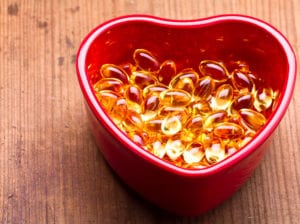Written by Jessica Patella, ND. This study suggests that Vitamin D supplementation during the winter months may support the body’s ability to recovery from psychophysiological stress.
 A recent study found eating fatty fish during the winter improved stress resilience in forensic inpatients with mental health problems 1. It was speculated that because fatty fish are a rich source of vitamin D and vitamin D is typically decreased in the winter months in humans, that vitamin D may play an important role in stress resilience 2. Therefore, a follow-up study has been conducted to examine the effects of supplementing vitamin D on stress response during the winter 2.
A recent study found eating fatty fish during the winter improved stress resilience in forensic inpatients with mental health problems 1. It was speculated that because fatty fish are a rich source of vitamin D and vitamin D is typically decreased in the winter months in humans, that vitamin D may play an important role in stress resilience 2. Therefore, a follow-up study has been conducted to examine the effects of supplementing vitamin D on stress response during the winter 2.
Heart rate is a simple, non-invasive measure of health. Studies have found that a low resting heart rate variability (HRV; regarded as an index of peripheral nervous system activation) and high resting heart rate (HR) are associated with poorer physical and mental health 2,3. This is because the body is constantly working overtime and is therefore a risk factor for mortality and morbidity 2,3. Another study has shown that a diet without fatty fish, showed an increase in heart rate from summer into winter, thus creating the question of how much vitamin D may play a role 2,4? There is also a question of the relationship between vitamin D and serotonin, but research is inconclusive to this point 2. Therefore, the previously mentioned measures were used to further understand and investigate the relationships to stress resilience in the current study 2.
The study included 86 male volunteers at a secure inpatient treatment facility. The participants were randomly divided into two groups, the placebo group (n=43) and the vitamin D treatment group (n=43; 40 micrograms cholecalciferol). All participants were detained and most had personality disorders (antisocial and borderline) and substance abuse disorders (72% White, 19% Black, 8% Native American, 1% Asian/Pacific Islander). Participants received the supplements daily from 7 January to 22 May and all participants had a normal vitamin D level (51-74 nmol/L) at the beginning of the study 2.
The stress-response was tested via computerized cognitive tests where participants were asked to answer questions as quickly and accurately as possible. The test itself is used to elicit stress, but an additional noise was added at varied intensity and frequency to increase the stress of the situation. The computer then recorded reaction time and accuracy, while heart rate was being monitored as well 2.
The results were as follows:
- There was a significant increase in vitamin D from pre- to post-intervention in the vitamin D group (p<0.001; d=0.69), while the placebo group showed a significant decrease in vitamin D from pre- to post-intervention (p<0.001; d=0.60).
- The vitamin D group had a significant decrease in HF-HRV from baseline to stress (p=0.002; d=0.19) and a significant increase from stress to recovery (p, 0.001; d=0.33), indicating that the stressor was “felt” and that supplementation helped the heart rate variability response to stress.
- The placebo group also had a significant decrease in HF-HRV from baseline to stress (p<0.001; d=0.23), but did not show an increase from stress to recovery, indicating that the stressor was “felt” but that heart rate variability remained low and therefore was a poorer reaction to stress.
- There were no significant changes in serotonin or cortisol levels in either group.
In conclusion, vitamin D supplementation during winter months seems to influence stress resilience during the spring. However, this study was conducted in a small sample of male forensic inpatients; therefore, it is difficult to say if you can generalize these results to the general population. Patients with anti-social personality disorder also may not experience stress in the same way as those in a healthy mental state, although these results could be helpful to other inmates 2.
Source: Hansen, Anita L., Gina Ambroziak, David Thornton, James C. Mundt, Rachel E. Kahn, Lisbeth Dahl, Leif Waage et al. “Vitamin D Supplementation during Winter: Effects on Stress Resilience in a Randomized Control Trial.” Nutrients 12, no. 11 (2020): 3258.
© 2020 by the authors. Licensee MDPI, Basel, Switzerland. This article is an open access article distributed under the terms and conditions of the Creative Commons Attribution (CC BY) license (http://creativecommons.org/licenses/by/4.0/)
Click here to read the full text study.
Posted December 21, 2020.
References:
- Hansen AL, Ambroziak G, Thornton D, Dahl L, Molde H, Grung B. Fatty fish intervention and psychophysiological responses to mental workload in forensic inpatients: A randomized control trial. Journal of Psychophysiology. 2020;34(1):10.
- Hansen AL, Ambroziak G, Thornton D, et al. Vitamin D Supplementation during Winter: Effects on Stress Resilience in a Randomized Control Trial. Nutrients. 2020;12(11).
- Aune D, Sen A, ó’Hartaigh B, et al. Resting heart rate and the risk of cardiovascular disease, total cancer, and all-cause mortality – A systematic review and dose-response meta-analysis of prospective studies. Nutrition, metabolism, and cardiovascular diseases : NMCD. 2017;27(6):504-517.
- Hansen AL, Olson G, Dahl L, et al. Reduced anxiety in forensic inpatients after a long-term intervention with Atlantic salmon. Nutrients. 2014;6(12):5405-5418.

